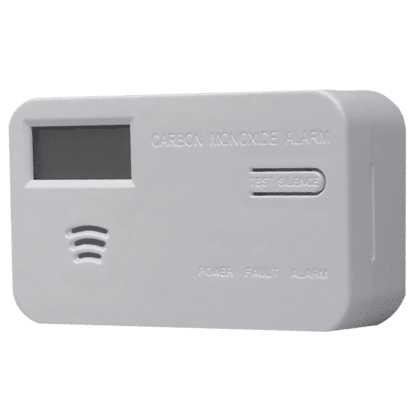


Alarms should be placed in any room that has a fuel burning appliance.Alarms purchased should be audible alarms, or hard of hearing alarms (avoid ‘colour change’ or ‘black spot’ indicator tools).Follow the manufacturer’s instructions on how and where to fit.If purchasing an alarm for a houseboat or caravan, please note that they need to comply with a different British standard: BS EN50291-2.Only buy alarms that have been certified to British Standard EN50291 and have the British or European approval mark, such as the Kite mark.Get your CO alarm/s from a reputable DIY store or supermarket.It's also a good idea to familiarise yourself with our information below about the signs of CO poisoning, and learn what to do if you suspect someone may be affected. You therefore may wish to keep a CO alarm in the bedroom. When sleeping, it is important that your alarm would wake you if it sounds. It's really important to fit a CO alarm in all rooms containing fuel burning appliances, ensuring that the alarm is able to be heard throughout your home. If your home is a houseboat, carbon monoxide can also be produced by: Gas boilers and appliances including fires.Portable heaters using liquid petroleum gas (LPG).Blocked or poorly maintained chimneys or flues.If you believe there is a danger from gas, contact the Gas Emergency Helpline on 0800 111 999. You may need an engineer to inspect your appliances and flues to check that all is well.

Do not re-enter the home until the source of the CO has been addressed/fixed by a qualified professional.For houseboats, please refer to the LFB residential boat safety booklet in the ‘Useful Downloads’ section below for contact information in an emergency. Before you return to your home it is very important to call the 24 hour Gas Emergency Number on 0800 111 999 and tell them what has happened and receive safety advice (even if the suspected source of the CO is not a gas appliance).They can do a blood or breath test to check. See your doctor or go to hospital – let them know that you suspect CO poisoning. If you suspect CO poisoning, always seek immediate medical advice.If someone is showing signs of poisoning or has collapsed, get them outside, call 999 and ask for an ambulance.It can also occur if flues, chimneys or vents are blocked or poorly maintained. This can happen when appliances such as boilers, cookers, heaters, gas fires and solid fuel burners are faulty, have been incorrectly fitted, or not regularly serviced. CO is difficult to detect because you cannot taste, see or smell it. CO fumes are silent, highly poisonous fumes that are produced by the incomplete burning of fossil fuels (e.g.


 0 kommentar(er)
0 kommentar(er)
